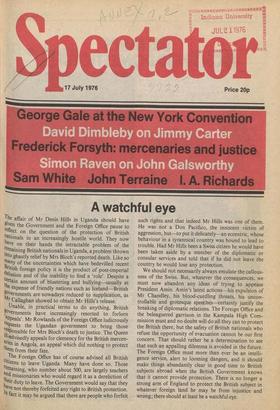A watchful eye
The affair of Mr Denis Hills in Uganda should have given the Government and the Foreign Office pause to reflect on the question of the protection of British nationals in an increasingly hostile world. They now have on their hands the intractable problem of the remaining British nationals in Uganda, a problem thrown Into ghastly relief by Mrs Bloch's reported death. Like so anY of the uncertainties which have bedevilled recent tirttish foreign policy it is the product of post-imperial delusion and of the inability to find a 'role'. Despite a certain amount of blustering and bullying—usually at the expense of friendly nations such as Iceland—British governments are nowadays reduced to supplication, as Mr Callaghan showed to obtain Mr Hills's release. Unable, in practical terms to do anything, British Fovernments have increasingly resorted to forlorn appeals'. Mr Rowlands of the Foreign Office ludicrously requests the Ugandan government to bring those responsible for Mrs Bloch's death to justice. The Queen nITadvisedly appeals for clemency for the British mercenaries in Angola, an appeal which did nothing to protect them from their fate.
The Foreign Office has of course advised all British citizens to leave Uganda. Many have done so. Those remaining, who number about 500, are largely teachers and missionaries who would regard it as a dereliction of their duty to leave. The Government would say that they h, ave not thereby forfeited any right to British protection. in fact it may be argued that there are people who forfeit such rights and that indeed Mr Hills was one of them. He was not a Don Pacifico, the innocent victim of aggression, but—to put it delicately—an eccentric, whose behaviour in a tyrannical country was bound to lead to trouble. Had Mr Hills been a Swiss citizen he would have been taken aside by a member of the diplomatic or consular services and told that if he did not leave the country he would lose any protection.
We should not necessarily always emulate the callousness of the Swiss. But, whatever the consequences, we must now abandon any ideas of trying to appease President Amin. Amin's latest actions—his expulsion of Mr Chandley, his blood-curdling threats, his uncontrollable and grotesque speeChes—certainly justify the breaking of diplomatic relations. The Foreign Office and the beleaguered garrison in the Kampala High Commission must and no doubt will do all they can to protect the British there, but the safety cf British nationals who refuse the opportunity of evacuation cannot be our first concern. That should rather be a determination to see that such an appalling dilemma is avoided in the future. The Foreign Office must more than ever be an intelligence service, alert to looming dangers, and it should make things abundantly clear in good time to British subjects abroad when the British Government knows that it cannot provide protection. There is no longer a strong arm of England to protect the British subject in whatever foreign land he may be from injustice and wrong; there should at least be a watchful eye.


































